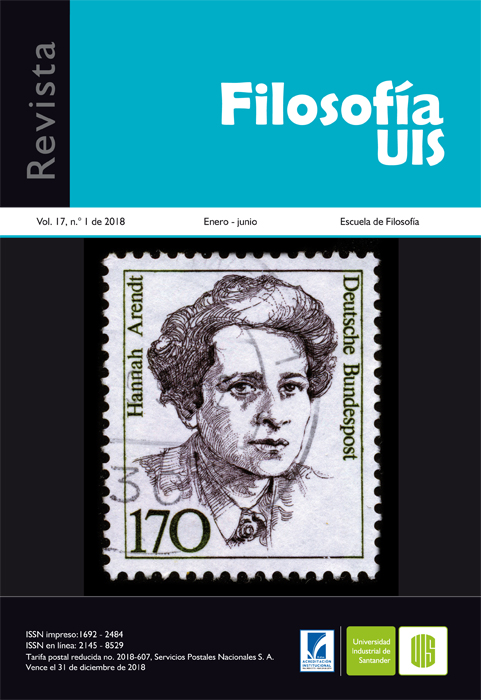Hermeneutics in the Communicational Theory of Law: Theory of Texts
Published 2018-05-16
Keywords
- Communication Theory of Law,
- legal hermeneutics,
- legal interpretation,
- philosophy of law,
- theory of texts
How to Cite
Copyright (c) 2018 Revista Filosofía UIS

This work is licensed under a Creative Commons Attribution 4.0 International License.
Abstract
The Communication Theory of Law –TCD– of the Spanish professor Gregorio Robles Morchón assumed from the beginning the idea that Law is basically an exercise of communication of meanings. Using the theories of Dilthey and Gadamer, Robles rethink the notion of text overcoming the limitation imposed by the classic view of positivism (now in crisis). Starting from Law as a hermeneutic exercise (Hermeneutic Theory of Law) and from an optimistic vision of hermeneutics, it will be shown how the TCD offers a revitalization of the hermeneutic work and becomes useful in the teaching of Law.
Downloads
References
Barthes, R. (2005). S/Z. Madrid: Siglo XXI.
Benoist, J. C. (2007). Ilustración dualidad Onda Partícula (imagen), licencia creative commons cc by 2.5, recuperado de https://lejournal.cnrs.fr/articles/donner-dusens-a-la-mecanique-quantique
Catalán, J. y Zabala, S. (2011). ¿Por qué no hay hechos sino sólo interpretaciones? Revista claves de razón práctica, (211), 26-29.
Dilthey, W. (1944). El mundo histórico. México D.F.: Fondo de Cultura Económica.
Dilthey, W. (1949). Introducción a las ciencias del espíritu. México D.F.: Fondo de Cultura Económica.
Dilthey, W. (2000). Dos escritos sobre hermenéutica: El surgimiento de la hermenéutica y los Esbozos para una crítica de la razón histórica. Madrid: ISTMO.
Dworkin, R. (1984). Los derechos en serio. Barcelona: Ariel.
Dworkin, R. (2010). ¿Deben nuestros jueces ser filósofos? ¿Pueden ser filósofos? Revista Isonomía, (32), 7-29.
Fernández, M. M. (2015). Frente al imposible espejo de la naturaleza: Rorty y Habermas. Revista Daimon, (65).
Gadamer, H. (1991). La actualidad de lo bello. Barcelona: Paidós.
Gadamer, H. (2002). Acotaciones hermenéuticas. Madrid: Trotta.
Gadamer, H. (2006). Verdad y Método II. Salamanca: Sígueme.
Grondin, J. (2002). Introducción a la hermenéutica filosófica. Barcelona: Herder.
Grondin, J. (2008). ¿Qué es la hermenéutica? Barcelona: Herder.
Guillaume, P. (1976). Psicología de la forma. Buenos Aires: Psiqué.
Habermas, J. (2009). La lógica de la ciencias sociales. Madrid: Tecnos.
Kristan, A. (2009). Hiperliteratura y Derecho: Unidad de texto y diversidad de lecturas. Revista DIXI, (12). Traducción de Juan Pablo Sterling Casas, Bucaramanga, Centro de Investigaciones Socio jurídicas CIS. Bucaramanga: Universidad Cooperativa de Colombia Seccional Bucaramanga, ISSN 0124-7255.
Landow, G. P. (1994). Hypertext Theory. Baltimore: John Hopkins University Press.
López, M. C. (2014). Verdad o Interpretaciones: Gadamer versus Nietzsche. Eikasia Revista de filosofía, (56), 105-126.
Lotman, I. (1996). La semiosfera I. Madrid: Forensis-Cátedra Universitat de Valencia.
Matlin, P. A. y Foley, M. A. (1996). Sensación y percepción. México DF: Prentice Hall.
McCormick, N. (1978). Legal Reasoning and Legal Theory. Oxford: Oxford University Press.
Nietzsche, F. (1981). La voluntad del poderío. Madrid: EDAF.
Nietzsche, F. (1987). Genealogía de la moral. Madrid: Alianza.
Oviedo, G. (2004). La definición del concepto de percepción en psicología con base en la teoría Gestalt. Revista de Estudios Sociales, (18), 89-96.
Prieto, S. L. (1985). Teoría del derecho y filosofía política en Ronald Dworkin. Revista Española de Derecho Constitucional, (5)14, 353-377.
Robles, M. G. (1977). El Origen de la Sociología del Conocimiento. Revista Derecho, Razón Práctica e Ideología, Anales de la Cátedra Francisco Suárez, (17), 91-102.
Robles, M. G. (1982). Epistemología y Derecho. Madrid: Pirámide.
Robles, M. G. (2003). Introducción a la teoría del derecho. Barcelona: Debate.
Robles, M. G. (2015). Teoría del Derecho: Fundamentos de Teoría Comunicacional del Derecho. Navarra: Civitas-Thomson Reuters-Aranzadi.
Rorty, R. (2010). La Filosofía y el Espejo de la Naturaleza. Madrid: Cátedra.
Sterling, J. (2013). Hermenéutica y Argumentación Jurídica: Límites a la discrecionalidad Judicial. En Grandez, P. y Morales, F. (Eds.), La Argumentación Jurídica en el Estado Constitucional. Lima: Palestra.
